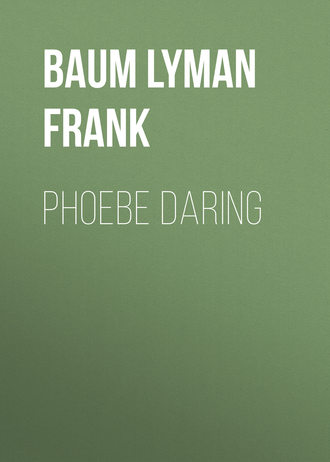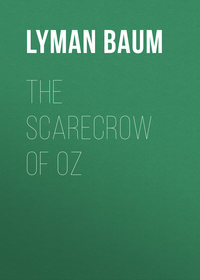 полная версия
полная версияPhoebe Daring
“None of those,” replied the governor, musingly. “The woman whom I think has been the cause of your friend Toby’s past misfortunes and present danger is – Mrs. Ritchie.”
Both Judith and Phoebe stared at him in amazement.
“Did she steal her own box, then?” said Phoebe.
“No, indeed; but she accused Toby Clark with a purpose, and she intends to get him a long prison sentence – also with a purpose.”
“What purpose, sir?”
“I don’t know. That is still dark. But we shall turn the light on it. Perhaps Mr. Spaythe knows, by this time.”
“Mr. Spaythe?”
“To be sure,” replied Cousin John blandly. “Why do you suppose he appropriated that paper of Mrs. Ritchie’s, to which he had no legal right, unless it contained something that required investigation?”
“Oh; I never thought of that.”
“Mr. Spaythe knew that Mrs. Ritchie had no right to the paper, and was not acting squarely in regard to it. So he put the paper in a safe place until he could discover the truth. It doesn’t take much of a detective to figure that out, Phoebe. It’s the science of deduction. Let’s go a little further: The paper concerns Toby Clark. That explains why this reserved banker took the boy to his own home, to safeguard his person or his interests until the truth could be learned. It’s as plain as a pikestaff, Miss Conspirator. You had all the pieces of the puzzle, but could not fit them together.”
“But – the woman who stole the box?” asked Judith, eagerly.
“Bother the woman who stole the box! What do we care about her?” retorted Cousin John. “It is true she stirred up this mess, but the stew may prove a savory one for Toby Clark, in the end. In that case we cannot be too thankful that the poor creature yielded to temptation. She has gained no material benefit, for the stolen property is all restored; but fate had used her to right a grievous wrong. Let us treat her with grateful consideration.”
Phoebe drew a long breath, striving to reconcile the governor’s view of this mysterious case with the prejudices she had so long encouraged in her own mind. She could not yet see by what process he arrived at the astonishing solution of the problem he now advanced, but the keen lawyer was quite satisfied that he had “nailed the truth.” Judith was fully as perplexed as Phoebe and after a pause she inquired:
“Will Mr. Spaythe’s discovery, then, clear Toby Clark of the charge against him?”
“Eh? Perhaps not. I’ve no idea what the discovery is and we must have more information on that subject. My idea is that Mrs. Ritchie will be forced to withdraw her charge; but the case might be taken up by the public prosecutor and young Clark condemned, unless we manage to get the case out of court altogether.”
“Even then,” said Phoebe, “Toby’s good name will not be cleansed. Many people will say he escaped paying the penalty of his crime, but was really guilty. The evidence they have brought against him is very strong.”
“Cleverly argued, Phoebe. I see your point. We must not be content with whitewashing the young man; we must restore him to his friends as sweet and clean as before. So, after all, we can’t quite ignore the woman whose folly caused all the mischief; nor even your friend Dave Hunter, who obtained possession of the contents of the box and tried to throw the blame onto Toby in order to save one whom he loved.”
“That’s it, sir. I think that was Dave’s motive.”
“Well, the sooner we begin to burrow the sooner we shall unearth the truth. I want to see Sam Parsons, first of all.”
“I will send Don for him,” proposed Judith.
“If you please, Cousin.”
It was Saturday and Don chanced to be within hailing distance. He accepted the mission with joy and lost no time in running to the constable’s house.
“Hurry up, Sam,” he said: “The governor’s at our place and wants to see you.”
Sam sat down in his rocker.
“Now?” he inquired.
“Right away. He came this morning, you know. Perhaps he’s goin’ to promote you; make you Chief of Police or Grand Marshal. The governor can do anything, Sam.”
Sam shook his head. He rocked to and fro, thinking deeply and dreading the governor with a cowardly sinking of the heart.
“Well, what are you going to do? Mutiny?” asked Don impatiently.
The constable sighed. Then he rose and picked up his hat, walking slowly in the wake of his eager conductor to face the man he most feared.
“Good morning, Parsons. I know you well,” said the governor. “You’re an honest man and a good officer. Who took Mrs. Ritchie’s box from Judge Ferguson’s office?”
“I – I – ”
“Who stole the box?” more sternly.
“Sir, a – a – ”
“Parsons!”
“Hazel Chandler, sir.”
“Thank you. I thought so. Now, then, sit down and tell me about it.”
Perspiration was oozing from the constable’s forehead. He wiped it away and sat down, staring stupidly at the great man and wondering how he had come to admit a fact that he had sworn to keep secret to his dying day.
“There is nothing to tell, sir,” he said weakly.
“Begin at the beginning, stating why you spied in the hallway, outside of Judge Ferguson’s door.”
“The night before, sir, I had seen – seen – ”
“Hazel.”
“I had seen Hazel carrying the box home. She passed under a light and I was in the shadow. It was Mrs. Ritchie’s blue box. The next day I watched. She brought the box down to the post office with her, wrapped in a cloak to make the bundle look round, and then covered with paper. Everyone was excited over the judge’s death, that day. The girl watched her chance and in the afternoon stole upstairs with the box, put it on the office table and hurried away. I sneaked up afterward and looked through the keyhole, but I found Hazel had forgotten to lock the door behind her, although she had carried off the key. I went in and looked at the box. It was unlocked and empty, except for a paper or two, which I did not touch. I left it there and went into the post office; but Will Chandler, Hazel’s father, said she had run over to the Ferguson house on an errand.”
“By the way, Phoebe,” said Cousin John, “can you get Janet Ferguson for me?”
“Yes; I can telegraph to her from my room.”
“Thank you.”
Phoebe ran up to telegraph Janet, asking her to come over at once to see the governor. Meantime Sam Parsons resumed his story.
“You still watched the office?” asked Cousin John.
“Yes, sir. After Hazel returned, Will Chandler took the office key to Holbrook and asked him to hand it to Mr. Spaythe, and not long afterward the banker came over and went up to the office. Will had caught me a couple of times in the hallway, so I didn’t dare stay there any longer. I went up to our lodge room, over the drug store, which is just opposite, and from the window there I could see into the windows of Judge Ferguson’s offices. I saw Mr. Spaythe go in and examine the box. He read a paper that was in it and then put the paper in his pocket. Afterward he wrapped up the box and took it away to his office. I was in deadly fear, sir, that Hazel’s theft of the box would be discovered. I imagined Mr. Spaythe had taken it away to hold for evidence; so I followed to his office.”
“Why did you fear Hazel’s discovery?” asked the governor. “Is it a constable’s duty to shield a criminal?”
“I wasn’t a constable then, sir; I was just a man. Hazel has always been a favorite of mine, from babyhood,” said Sam. “Her father, Will Chandler, is my best friend. We play chess together and he belongs to my lodge. But aside from that the Chandlers are rated the proudest and most respectable family in Riverdale – bar none. Their ancestors came over in the Mayflower, and then founded this village. Will is the government’s trusted agent. If Hazel’s foolish act is discovered, the disgrace will kill Mrs. Chandler, who is a very proud woman and in delicate health, and there are six little brothers and sisters whose lives will be ruined.”
“She should have thought of that,” said the governor.
“And Hazel herself is engaged to be married to Dave Hunter, one of the finest young men in the village,” continued Sam. “I think if Dave knew what she had done it would mar all his future life; and he has a sister and mother depending on him. That was why I shielded her, sir; it was better to let Toby Clark suffer alone than to overwhelm so many honest folks with disgrace.”
“You took the box from Mr. Spaythe?” asked the governor, without commenting upon the man’s excuses.
“Yes, sir. He left it on the office table and went into the bank, and I went in and got it. I carried it home and hid it, to save Hazel, and afterward I was astonished to find another box, just like it, in Toby Clark’s back yard. I decided it was put there with a purpose – to prove Toby was guilty – so I kept quiet about it.”
“Wasn’t that very irregular, Parsons?”
“Very, sir. I’ll lose my star, and perhaps I’ll be prosecuted. But I’m glad I did it.”
CHAPTER XXIII
HOW A WRONG LOOKED RIGHT
Janet Ferguson came in a moment later, having promptly answered Phoebe’s summons. After greeting her in his kindly way the governor said:
“I’m puzzled about your father’s keys. What happened to them the day following his death? Tell me, please?”
Janet tried to remember.
“Usually he left his office key at the post office, but carried the bunch of small keys on his person,” she replied. “Father was very absent-minded at times, and I think he was not feeling quite himself the evening before – before his attack. For it seems he hung his key ring, containing all the keys, on the peg inside the post office window, instead of leaving just the office key. But the next morning Hazel Chandler discovered the keys and brought them to me – all except the office key, which was left hanging upon the peg. That key Mr. Chandler afterward turned over to Mr. Spaythe, to whom Toby Clark also gave his office key.”
“And the smaller keys – the ones that unlocked the cupboard and the private boxes, such as Mrs. Ritchie’s?”
“When Hazel brought them to me I asked her to carry them to Mr. Spaythe, and I understand she did so. She delivered them to him on her way back to the post office.”
“Of course. It is all very clear and comprehensive now, Miss Ferguson. I thank you. I am not making an official investigation of this case, you understand. Phoebe and I have concocted a little conspiracy to arrive at the truth and we are doing our best to clear up the mystery of Mrs. Ritchie’s lost box – for personal reasons only.”
“I know that Phoebe has been anxious to save Toby Clark,” said Janet earnestly; “and I am also anxious. Can I assist you in any way?”
“Not at present. If we need you again we will let you know.”
So Janet went away and the governor also dismissed Sam Parsons, telling the constable he might continue to guard his secret until otherwise instructed. Then Cousin John briskly rose and said to Phoebe:
“Let us go and call on Dave Hunter.”
The girl dreaded that interview, remembering her last defiant visit to the telegraph operator; but she knew it could not be avoided. Already she was amazed at the ease with which the governor fitted together the pieces of her puzzle, and she was eager to see what link in the evidence Dave could furnish.
They found the young fellow alone in his office. He recognized the governor at a glance, for through the exchange of telegrams the operator knew he was due to arrive in Riverdale that morning and why he had come. At once Dave’s face hardened and his jaws locked together with firm obstinacy. But the governor, noting these signs of opposition, merely smiled.
“Hunter, my lad,” said he, “I’d like to dance at your wedding. I’m not sure you’ll invite me, and I’m not sure I could come if invited; but what I mean to assert is that I’d really like to help you celebrate that important event. Eh?”
Dave seemed confused. He had no answer ready for this form of attack.
“There appear to be certain complications, however, which at present stand in the way of your ambition,” continued the governor in an amiable tone. “Hazel has a fine nature and a gentle heart, but her character isn’t fully developed yet and, in a late emergency, she allowed herself to be led astray. She knew there was a great deal of money in Mrs. Ritchie’s box; her father had once seen it and talked of it in the family circle; so when the judge carelessly left all his keys in the post office, one evening, Hazel was tempted and didn’t stop to consider consequences. She was sick and tired of the drudgery she was enduring and knew she could not be married to you until you had acquired more money; so she foolishly yielded to the temptation and at night, when she locked up her store and the post office, she visited Judge Ferguson’s office, unlocked the cupboard, took down Mrs. Ritchie’s box and carried it home. In the seclusion of her room she found the key to the box, opened it and dumped the contents on the bed. The last thing to tumble out was a long yellow envelope marked ‘Private,’ and Hazel hastily tore this open, with the idea that it contained money. Finding it to be merely a legal document, in which she was not interested, she tossed it back into the box. Understand, Hunter, I won’t vouch for the accuracy of every detail of this story; but in the main you know it is correct.”
Dave’s eyes were fairly bulging from their sockets as he stared at the governor and heard him lay bare a secret he thought had been faithfully guarded.
“You – you’ve seen Hazel?” he stammered.
“No; not yet. But let me continue. That night, perhaps fearing interruption, the girl had no chance to examine the contents of the box, which she hid somewhere in her room. Next day she took the box down town with her, wishing to get rid of it, and managed during the afternoon to return it to Judge Ferguson’s office. But she had no time to put it back in the cupboard, because she had left the post office downstairs alone. So she simply placed it on the table and afterward got rid of the keys as soon as possible.
“No one suspected her. Toby Clark was suspected, but not Hazel Chandler. Yet Hazel was in a quandary. She had in her possession a great deal of money, some valuable bonds, and a lot of useless papers belonging to Mrs. Ritchie. Naturally she confided in her sweetheart, not realizing even yet the seriousness of her offense, but rather exulting in the fact that this money would hasten her wedding day. The young man to whom she was engaged, however, listened to her story with horror and despair. He realized the enormity of the girl’s crime and knew that its discovery meant prison for her, a broken heart for him, and ruined lives for them both.”
Dave’s stern features had gradually relaxed to an expression of abject misery. At the vivid scene conjured up by his accuser he sobbed aloud and dropped his face in his hands. But the governor quietly continued:
“The young man’s plight was indeed pitiful, but his poignant sorrow blurred his reason and led him to a subterfuge so cruel and unmanly that his error was scarcely less iniquitous than Hazel’s. To save the girl he loved he endeavored to throw the burden of guilt on an innocent person, a friendless boy and a cripple. He was not the first to accuse Toby Clark, but Toby’s arrest gave him the idea. Forcing Hazel to give to him the entire contents of the rifled box, he selected all the papers that were of no value to anyone but the owner and hid then in the back room of the shanty. Then, to make sure they would be found, he wrote anonymous letters to two parties whom he thought would be interested in the search, telling where the papers were hidden.”
The governor paused a moment.
“I am not sure,” said he, “why you retained the money and bonds, Hunter. You may have had some vague idea of keeping them, at the time; but afterward I am sure you thought better of it, for you gave up the stolen money, again implicating Toby Clark.”
“I – I wanted to give it all up in the beginning,” groaned Dave, in broken, pleading accents; “but I was bewildered, then – I’ve been bewildered ever since, I think – and the thought came to me that if Hazel should be arrested I would need money to defend her. I didn’t much care what I did, if only I could manage to save Hazel. But – after a time – I thought the danger had passed and no one would now connect her with the theft; so I wanted to get rid of the money, which was a horror to me. I thought the best way was to put it in Toby’s house, as I did the papers.”
“I follow your argument,” said the governor. “Had you been more experienced in crime you would have known that the greatest danger of discovery lay in those anonymous letters. Such things are very easily traced. Do you know that Phoebe Daring was able to connect you with this crime by means of those very letters? As a matter of fact, however, they did not lead to the discovery that Hazel Chandler took Mrs. Ritchie’s box. Two different people saw her carry it home; yet I suppose she has imagined she escaped observation.”
“She – she seemed quite sure of that, sir.”
“No doubt. The criminal is always blind. If the time ever comes when everyone realizes that the law is more clever than the individual, that justice is rampant and will not be denied and that punishment follows an undiscovered crime as surely as if it were discovered, then indeed humanity may shrink from committing lawless acts. The more inexperienced and simple-minded the offender, the more certain he or she is of outwitting all the rest of the world. As a consequence, our prisons are crowded and our trial courts cost us millions of dollars annually. It is so much more simple and safe to obey the laws of humanity and of nations, that I wonder people do not prefer to walk uprightly.”
Dave had no reply to this, although there is no doubt he frankly admitted its truth. He now knew that the governor and Phoebe, and doubtless others, were in possession of the secret he had guarded so jealously, and in this crisis his thoughts were all of the girl he loved and had sought to shield.
“Sir,” he said after a moment, “is there any way in which I can assume all the punishment? Suppose that I confess that I stole Mrs. Ritchie’s box; will you and Phoebe help me to carry out the deception and take Toby Clark’s place?”
“Why, that is what you should have done in the beginning,” said Cousin John. “Now it is too late for such vicarious atonement.”
Again Dave groaned.
“Mrs. Ritchie has all her property now,” he asserted. “Don’t you suppose she could be induced to save Hazel?”
“No; I do not.”
“It – it’s going to wreck a lot of lives, sir – the publicity and disgrace. The poor girl didn’t know what she was doing; indeed, sir, that is the truth. She – she’s sorry enough now. We’ve both suffered bitterly and – and been severely punished already. But I’ll take more punishment; I’ll do anything, sir, to keep Hazel out of it and save her and her people from infamy.”
“I can’t promise you anything, Hunter,” said the governor, evident sympathy in his tone. “I’m sorry for you. You were drawn into this thing merely because you are fond of the girl, and I admire you for standing by your sweetheart, through thick and thin. The faults you have committed, in striving to compel an innocent boy to suffer, are far from admirable; yet you have not a strong nature and there are many who might have acted just as you did. I will say this: if it can be arranged to clear Toby Clark in the eyes of all the world without condemning Hazel Chandler, I shall try to do so. Our first care will be to save Toby; afterward I will do what I can for Hazel.”
Dave was grateful for this promise and seized the governor’s hand in both his own to press it warmly.
“At present,” said Cousin John, “Phoebe and I alone are in possession of all the facts I have related. The two persons who saw Hazel take the box seem as anxious to shield her from public condemnation as you are. So I think you may hope for the best.”
With this they left the telegraph office and walked up the street.
“Where next?” asked Phoebe curiously. She had, by this time, so supreme a confidence in Cousin John’s ability to pick up scattered threads and smooth out all tangles that in her heart she believed the truth had now been laid bare in its entirety and thought nothing remained but to confirm the facts already gathered.
“We will see Mr. Spaythe next,” the great man replied.
CHAPTER XXIV
HOW THE MYSTERY CLEARED
It was only a few minutes walk to the bank and Mr. Spaythe received them in his private office, expressing little surprise at seeing the governor again in Riverdale but welcoming him with frank cordiality.
When they were seated the banker looked at his visitors with polite inquiry.
“I’m helping Phoebe get the facts in this Toby Clark case,” said the governor, speaking easily and as to an equal, for he knew Mr. Spaythe’s record and reputation. “In her confidences to me concerning the peculiar circumstances surrounding this affair, which seems to have worn a veil of mystery from the first, she has mentioned the paper you found in the Ritchie box.”
The banker bowed but remained silent.
“There has been raised a great hue and cry for that paper, on the part of Mrs. Ritchie and her attorney,” continued the speaker; “therefore we may consider the document of prime importance to the old lady. When it fell into your hands you hypothecated it and carefully locked it in your safe; further evidence of its importance. Phoebe has concluded, from your unconditional defense of the accused boy, that you believe him innocent, in the first place, and also that the document referred to is in some way connected with – Toby Clark.”
Mr. Spaythe smiled.
“It’s difficult to keep a secret from Phoebe,” he replied.
“For my own part,” the governor resumed, “I have figured from your long silence regarding the paper that you have been investigating its validity or for some reason have been seeking outside information concerning it. I hope I am not in any way forcing your hand by asking if my surmise is correct and if you have yet received the information you desire.”
“Allow me to add that it is difficult to keep a secret from the governor,” laughed Mr. Spaythe. “Really, sir, you and Phoebe have guessed so much that you are entitled to know more, and fortunately my first information of value concerning this paper reached me but a few hours ago, in the morning’s mail.”
“Through my interest in my Cousin Judith I became acquainted with Phoebe Daring,” said Cousin John. “Through my interest in Phoebe I became acquainted with the sad plight of Toby Clark, and my interest in humanity at large induced me to ‘play hookey’ from the business of governing this exacting state, long enough to run down here and help things to a climax. So, sir, as my time is limited, I – ”
“It will afford me pleasure to confide in you with the utmost frankness,” said the banker. “I would like you to know all that I know.”
“Thank you. I may say that we have finally run down the guilty party and are now certain that Toby Clark’s case will never come to trial.”
“Indeed!” exclaimed Mr. Spaythe. “Then you have solved a very perplexing mystery.”
“Have you had no hint of the truth?” inquired the governor.
“Not the slightest, although I have several times suspected my lawyer, a man named Holbrook.”
“And a very well meaning young fellow,” added the governor. “I think, from the information I have received, that Holbrook has conducted himself in a manly way that is distinctly creditable. But may I ask how you expected to save Toby Clark from prison without knowing who committed the fault of which he stands accused, and in the face of a mass of incriminating evidence against him?”
“Yes; I expected to save him through Mrs. Ritchie.”
“You can compel her to withdraw the charge?”
“Mrs. Ritchie is completely in my power. Would you mind telling me who first took the box from the judge’s cupboard?”
“A weak and thoughtless girl – Hazel Chandler – who was tempted to steal the money that she might sooner wed the young man to whom she was engaged.”
“Dear me. Hazel Chandler! How unfortunate.”
“There is a general disposition, among those who know the facts, to shield her,” suggested the governor. “The girl has already been punished – through fear, personal remorse and the reproaches of her fiancé. I can see no benefits to the public at large nor to the interest of justice to be gained by casting this foolish girl into prison. Her redemption, if redemption is still needed, may be better accomplished in other ways.”









